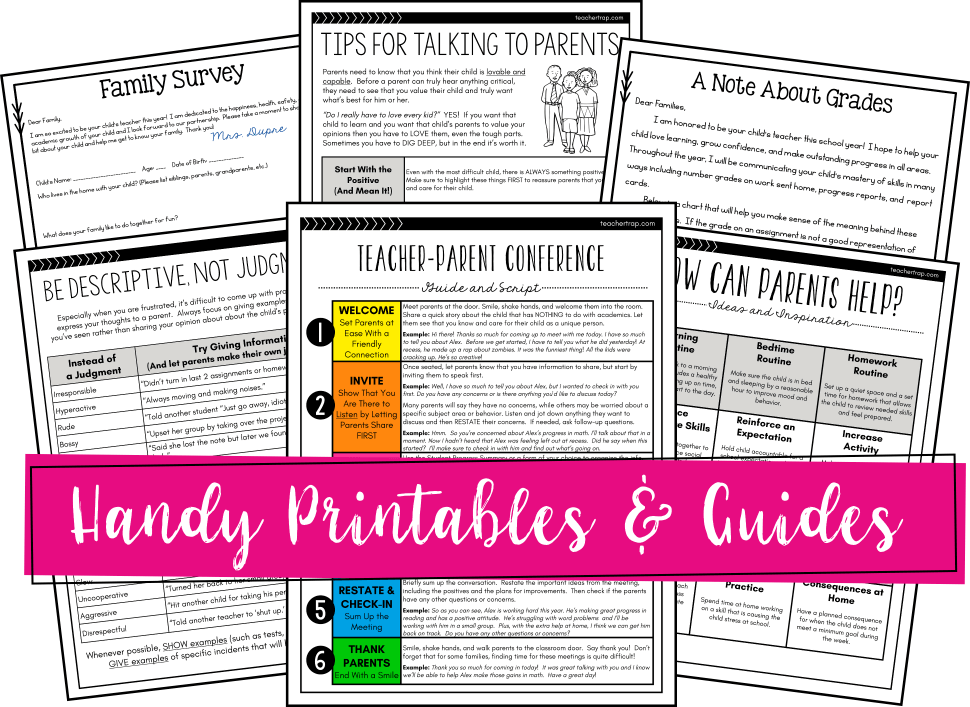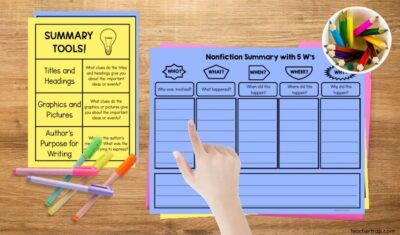Teachers want parent support, but we often ask for it in unrealistic or unhelpful ways. With a few shifts in thinking and a bit of strategy, you CAN get the help you need from parents!
Focus on the Essential Outcome
When parents come in for a conference, we often want to tell them EVERYTHING! We can easily overwhelm parents by sharing all the struggles and all the things that need to change. So the first step is determine the most important outcomes and then consider which ones are suited for enlisting parent help.
For example, if you have a child that is struggling in all areas academically, you might consider which area could be most impacted by something done at home. Or if the child is struggling with a variety of behavior issues, select the one thing that most needs to change. You can still share all of the information, but when it comes to asking for parent support, focus on what is ESSENTIAL.

Get Specific
Many parents WANT to help their child succeed in school, but simply don’t know how. For example, we often tell parents things like, “Your child is struggling in math. Please help her with math at home.” But parents are unfamiliar with the curriculum, with instructional methods, and with the strategies we teach. We need to give parents specific steps to take at home that will impact what is going on at school.
Rather than sharing the problem and hoping parents know what to do, give them specific tasks. “Your child is struggling in math. One thing that would make a big difference is if she knew her addition and subtraction math facts. Here is an online program she can use to practice. Can you make sure she spends 20 minutes practicing, 3 nights a week?”
Be Realistic
It would be wonderful if every family had happy, stress-free homes complete with great jobs, good health, and excellent time management. But the reality is that many parents are struggling with health issues, work schedules, financial stress, family drama, or other challenging circumstances. The reality is that their child’s school work may not be a priority.
When thinking about ways to get help at home, be realistic. Ask for help that is doable and manageable for the parent. For example, if you know a parent works in the evenings, look for something the child can do on their own and the parent could check on in the morning before school.
Look for Quick Wins
Many parents feel frustrated or hopeless when it comes to helping their child at school. They’ve tried things in the past and not seen success. Turn this around by giving parents tasks that lead to quick wins!
Reading is a great example. When a child struggles with reading, it can be extremely frustrating for a parent. Without the skills of a reading teacher, you often feel like you are just watching a sinking ship! Instead, give parents a specific, doable task. For example, you might send home a “just-right” book each week and ask that the child read it aloud multiple times in order to increase fluency. This avoids frustration for the parent and child and can let both parties feel some immediate success. Plus, it makes an real impact!
In my online course, Positive Parent-Teacher Partnerships, I’ve included a handy cheat sheet called “How Can Parents Help?” with specific ideas for powerful ways to get parent support at school. The course offers video workshops, tools and guides, and editable resources that make parent communication easy!
This page can also be found, along with other basic tools, in my Positive Parent Communication Pack on TPT.
When parents finally see the difference they can make in their child’s success at school, big changes tend to follow! Help parents make that transition and get parent support that truly impacts the child’s growth and learning!














